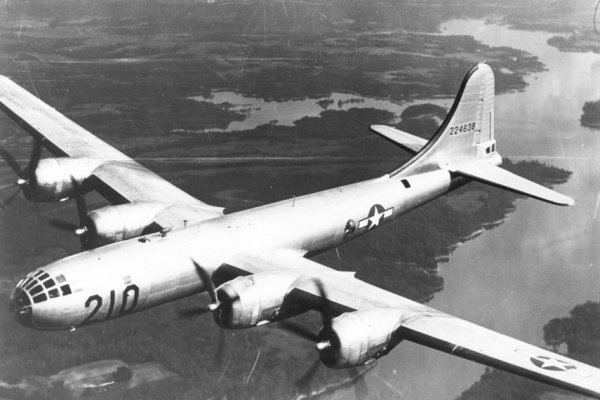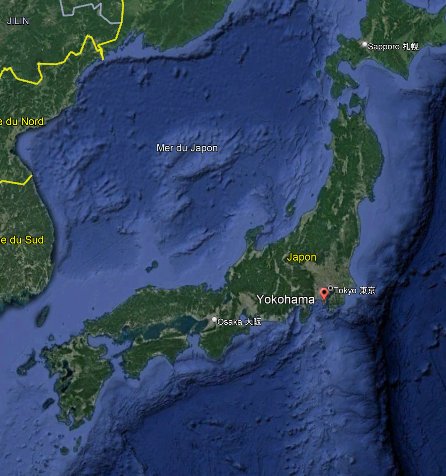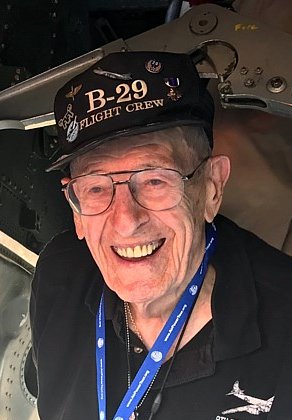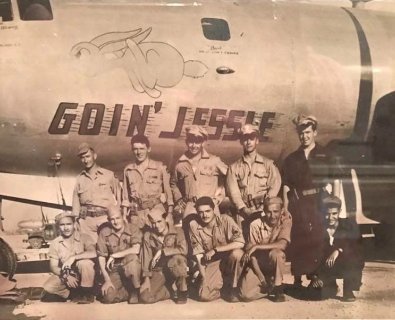ACUFO-1945-07-04-YOKOHAMA-1
In 2006, a NICAP ufologist found a UFO report - the term UFO being used by the witness - in a 1987 anthology book about the XXth Air Force operations in the Pacific during WWII.
In the book, Charles G. Chauncey, of Wichita, Kansas, USA, wrote that when he was a B-29 pilot and aircraft commander, aged 22, based at North Field, on Tinian Island in the Mariannas Islands, assigned to the 5th Squadron, 9th Bomb Group, he was flying his B-29 “Goin' Jessie” on a bombing mission on a planned target of Kawasaki. Due to some evasive action the radar operator became confused, and the bombs were dropped on Yokohama. Chauncey described what happen next:
“After coming away from our bomb drop, we saw the UFO's. I especially recall seeing two groups of them in single file. One group of six were lower than we were and coming towards us from the front, their heading taking them off to or left. The other group was more distant and headed in the opposite direction, but were at about our level. They each looked and appeared like a great ball of fire, but there was no fire trail. Their color was very subdued, not blazing like a torch. They did (not) bother us and we did not bother them.”
| Date: | July 4, 1945 |
|---|---|
| Time: | ? |
| Duration: | ? |
| First known report date: | 1987 |
| Reporting delay: | Hours, 4 decades. |
| Country: | Japan |
|---|---|
| State/Department: | Kanagawa |
| City or place: | Yokohama |
| Number of alleged witnesses: | 1 to 11 |
|---|---|
| Number of known witnesses: | 1 |
| Number of named witnesses: | 1 |
| Reporting channel: | Personal account in History book. |
|---|---|
| Visibility conditions: | ? |
| UFO observed: | Yes. |
| UFO arrival observed: | ? |
| UFO departure observed: | ? |
| UFO action: | Flew. |
| Witnesses action: | None. |
| Photographs: | No. |
| Sketch(s) by witness(es): | No. |
| Sketch(es) approved by witness(es): | No. |
| Witness(es) feelings: | ? |
| Witnesses interpretation: | UFOs. |
| Sensors: |
[X] Visual: 1 to 11.
[ ] Airborne radar: [ ] Directional ground radar: [ ] Height finder ground radar: [ ] Photo: [ ] Film/video: [ ] EM Effects: [ ] Failures: [ ] Damages: |
|---|---|
| Hynek: | ? |
| Armed / unarmed: | Armed, 12 12.7 mm Browning M2 machine guns. |
| Reliability 1-3: | 3 |
| Strangeness 1-3: | 2 |
| ACUFO: | Possible extraterrestrial craft, insufficient information. |
(Ref. nip1:) "THE NICAP WEBSITE":
July 4, 1945; near Yokohama, Japan
A/C Charles G. Chauncey was flying the B-29 on a bombing mission on a planned target of Kawasaki. Due to some evasive action the radar operator became confused and the bombs were dropped on Yokohama. Pilot Chauncey describes what happen next. “After coming away from our bomb drop, we saw the UFO's. I especially recall seeing two groups of them in single file. One group of six were lower than we were and coming towards us from the front, their heading taking them off to or left. The other group was more distant and headed in the opposite direction, but were at about our level. The each looked and appeared like a great ball of fire, but there was no fire trail. Their color was very subdued, not blazing like a torch. They did (not) bother us and we did not bother them.”
(Ref. nip2:) "THE NICAP WEBSITE":
Form: FI-4, Initial Report
Date: Wed, 17 Jan 2007 19:46:34 +0000 (GMT)
From: daniel wilson daniejon2000@yahoo.co.uk
Subject: July 4, 1945; near Yokohama, Japan, UFOs witnessed by the crew of a B-29
Cat: 11
To: Francis Ridge nicap@insightbb.com
July 4, 1945; near Yokohama, Japan
UFOs witnessed by the crew of a B-29
A/C Charles G. Chauncey was flying the B-29 on a bombing mission on a planned target of Kawasaki. Due to some evasive action the radar operator became confused and the bombs were dropped on Yokohama. Pilot Chauncey describes what happen next. “After coming away from our bomb drop, we saw the UFO's. I especially recall seeing two groups of them in single file. One group of six were lower than we were and coming towards us from the front, their heading taking them off to or left. The other group was more distant and headed in the opposite direction, but were at about our level. The each looked and appeared like a great ball of fire, but there was no fire trail. Their color was very subdued, not blazing like a torch. They did (not) bother us and we did not bother them.”
The B-29 that A/C Charles Chauncey was flying was called “GOIN JESSIE” which became the top performing B-29 of World War II. Chauncey of the 5th Squadron, 9th Bomb Group, was stationed at North Field on Tinian in the Mariannas Islands. Tinian was where the Enola Gay of the 509th Composite Group took off from to drop the atomic bomb on Hiroshima, on August 6, 1945.
Reference: THE GLOBAL TWENTIETH: AN ANTHOLOGY OF THE 20TH AF IN WWII, VOLUME II. Edited by Chester Marshall and Scotty Stallings. See page 164.
[Ref. sua1:] "SATURDAY NIGHT UFORIA" WEBSITE:
Another personal report from the 9th Bomb Group comes from a pilot, who recounted his air crew's encounter in The Global Twentieth: An Anthology of the 20th AF in WWII, Volume II (with forward by General Curtis LeMay). Charles Chauncey described his experience of July 4, 1945, as he piloted the B-29 named GOIN' JESSE:
After coming away from our bomb drop, we saw the UFO's. I especially recall seeing two groups of them in single file. One group of six were lower than we were and coming towards us from the front, their heading taking them off to our left. The other group was more distant and headed in the opposite direction, but were at about our level. They each looked and appeared like a great ball of fire, but there was no fire trail. Their color was very subdued, not blazing like a torch. They did not bother us and we did not bother them.
[Ref. tai1:] "THINK ABOUT IT" WEBSITE:
Date: July 4, 1945;
Location: near Yokohama, Japan
Time:
Summary: A/C Charles G. Chauncey was flying the B-29 on a bombing mission on a planned target of Kawasaki. Due to some evasive action the radar operator became confused and the bombs were dropped on Yokohama. Pilot Chauncey describes what happen next. “After coming away from our bomb drop, we saw the UFO's. I especially recall seeing two groups of them in single file. One group of six were lower than we were and coming towards us from the front, their heading taking them off to or [our] left. The other group was more distant and headed in the opposite direction, but were at about our level. The each looked and appeared like a great ball of fire, but there was no fire trail. Their color was very subdued, not blazing like a torch. They did (not) bother us and we did not bother them.”
Source:
The Boeing B-29 “Superfortress” was the heaviest bomber of the U.S. Army Air Forces, used in operations from May 8, 1944 and on. Its maximum speed was 574 km/h.
Its defensive armament was 12 Browning M2 12.7 mm machine guns.

|

|

|
Chauncey, Charles Graves, aka “Chaunce”, aka ”Chuck”, of Wichita, Kansas (photo above), was born on April 13, 1923, and passed away on April 6, 2018.
After attending Kansas University, he enlisted in the U.S. Army Air Corps in December 1942 and was called into service in February 1943. Completing his Cadet training in single and multiengine flight training in April 1944, he was commissioned a 2nd Lieutenant, and sent to Roswell, New Mexico, for training in the Boeing B-29 “Superfortress”.
He was in the new formation of the reactivated WWI 9th Bomb Group (Very Heavy), 5th Squadron. Upon completion of the formation of the new Bomb Group (2,300 personnel) and flight training, they were then transferred to the North Field on Tinian Island, Northern Marianas. His crew completed 35 missions over Japan, 13 daylight formation missions and 22 night single plane missions. Chauncey was the pilot, the other pilot was John Fleming, the Bombardier was Julius J. “Chip” Chilipka, the navigator was Jack Cramer. He flew on “The Deadliest Mission of WWII”, on Tokyo, Japan, March 9-10, 1945 (See wingsoverkansas.com/chauncey/a1544).
They named their aircraft “Goin' Jesse”, meaning, fast, going “like a bat out of hell”. It completed 52 missions with no aborts, a record. In June of 1945 he was upgraded from Pilot to Airplane Commander and 1st Lieutenant Rank.

|
He said of his plane:
“Our B-29, we named “GOIN' JESSIE”, was the 704th B-29 built here in Wichita in late 1944. Our crew picked it up at the Herrington KS Army Air Base. From there we flew it to Mather Field, which is close to San Francisco; then on to Hickam Field, Honolulu, Hawaii (had an engine change); Kwajalein Island; and finally to North Field, Tinian Island, a speck in the Pacific Ocean. North Field was the largest bomber base in the world at that time with its 4 - 8,500 ft blacktop runways and could accommodate over 250 B-29's.”
And:
“There were 11 flight crewman: Bombardier, 2 Pilots, Flight Engineer, Navigator, Radio Operator, 3 Gunners, Radar Operator, and Tail Gunner. Our plane, a Wichita B-29, flew 51 bombing mission and 1 POW supply mission with never an abort. Of our 35 missions our crew flew 32 of them, the balance was flown by other crews. Our Ground Crew Chief received the Legion of Merit after its 50 mission with no aborts.”
He was the recipient of: Asiatic-Pacific Theater w/3 Oak Leaf Cluster; The Distinguished Flying Cross; the Air Medal with 4 Oak Leaf Clusters and several Commendations. He left the service in September 1945, and lived in Chanute, Kansas, where he became president of Western Drilling Tool & Supply Co.
Since his WWII service days he received several honors: the “Goin' Jesse” crew was inducted into the Commemorative Air Force's American Combat Crew Hall of Fame; several CAF Magnolia Awards in the Jayhawk Wing; a Lifetime Achievement Award in CAF B29/B24 Squadron; and the Lifetime Achievement Award while representing all the WWII Very Heavy Bomber Crews by the Air Force Association. He was a WWII speaker for the CAF Wichita Jayhawk Wing, and spoke to many school classes of children and service groups about his wartime pilot experiences.
Possible extraterrestrial craft, insufficient information.
* = Source is available to me.
? = Source I am told about but could not get so far. Help needed.
| Main author: | Patrick Gross |
|---|---|
| Contributors: | None |
| Reviewers: | None |
| Editor: | Patrick Gross |
| Version: | Create/changed by: | Date: | Description: |
|---|---|---|---|
| 0.1 | Patrick Gross | December 21, 2023 | Creation, [nip1], [nip2], [sua1], [tai1]. |
| 1.0 | Patrick Gross | December 21, 2023 | First published. |